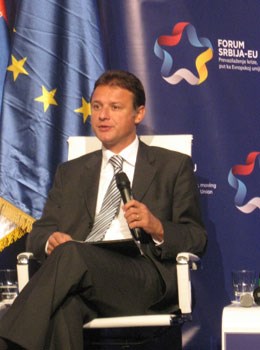Apart from the participation by European Council President Herman Van Rompuy, the Forum gathered numerous high officials from the Republic of Serbia, the European Union and the southeast European countries enveloped by the Euro-integration processes, as well as representatives of the academic community, civil society and economic sector
Apart from the participation by European Council President Herman Van Rompuy, the Forum gathered numerous high officials from the Republic of Serbia, the European Union and the southeast European countries enveloped by the Euro-integration processes, as well as representatives of the academic community, civil society and economic sector.
In his speech, the minister presented Croatia’s experience with the EU accession process, pointing out that having recently had closed the negotiations, Croatia was on the verge of membership. He said that the text of the Accession Treaty would soon be completed and was expected to be signed by late-November/early-December. He also expressed belief that after its successful ratification, Croatia would join the EU on 1 July 2013 as its 28th member. At that moment, Croatia would complete the historic process that has been taking place for the last two decades, during which it has achieved independence and became a member of NATO and the EU, said Minister Jandroković.
Saying that Croatia was a clear proof that all obstacles could be overcome, the minister stressed the importance of conducting reforms, primarily for the positive effects they had on the everyday life of citizens, as evidenced by a more efficient judiciary, the rule of law, all-out war against corruption, more competitive business environment and more open financial market. He pointed out that each country that strived for membership in the EU should therefore direct its potentials towards realizing that goal and understand that all of the reforms were to the benefit of its citizens.
Referencing the accession process, he noted that the first phase included numerous sensitive and important political issues, while the next one was technically more challenging, as attested by the context of the negotiation chapters, as well as the criteria for their opening and closing. This part of the integration process can for the most part be directly influenced, said Minister Jandroković, underlining at the same time the other dimension of the process which is related to the internal and external dynamic of the EU, and which is outside the influence of the acceding countries.
The internal dynamic pertains to the reforms and changes within the EU, as well as the numerous internal issues such as preserving the Schengen Area, migration within the EU, asylum policy and protection of the eurozone. There is also the external dynamic of the challenges the EU is faced with in its southern and eastern neighbourhood, as well as on a global level. All of this has a direct influence on the European Union’s position and perception towards future enlargement, said Minister Jandroković. He also emphasised that the lessons from the previous enlargement cycles had direct bearing on those that followed, which Croatia had felt itself. In that regard, he said that solving the political and technical issues was a test for the perseverance in reforms and presented the future members’ orientation towards adopting the European standards and values.
Despite Croatia’s experiences, which showed that bilateral issues could pop up and become an obstacle on the road of integration, the minister reiterated that Croatia had no intention of using the outstanding bilateral issues to impede the progress of any country on its Euro-integration path.
He said that Croatia had proven this by making its translation of the acquis readily available for all the candidates and potential candidates in this part of Europe, as well as by offering technical assistance and consultation to the countries in the region wishing to join the EU. Finally, a proof of this is also Croatia’s dedication towards being an advocate of the European future for all the countries of South Eastern Europe, as well as a strong advocate of regional cooperation.
During the Forum, Minister Jandroković also held several bilateral meeting with foreign ministers of the southeast European countries and other participants in the Forum, with whom he discussed Croatia’s future activities on the road towards full-fledged EU membership.
Press releases


